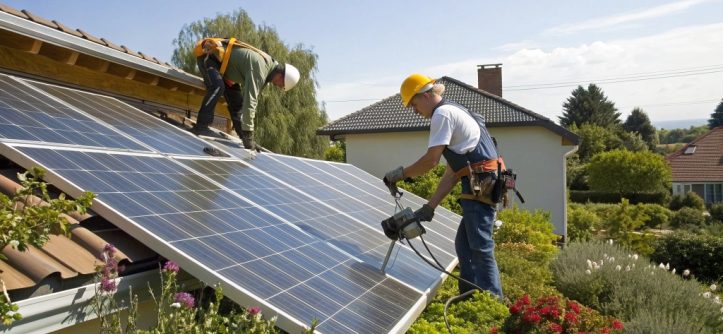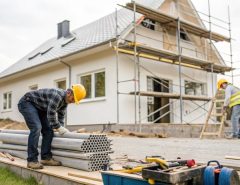The growing focus on sustainable living extends beyond our personal choices to the professionals we hire for home improvements. With increasing concern about climate impact, homeowners across the UK are seeking tradespeople and service providers who share their environmental values. Professional Saver highlights the importance of working with eco-conscious professionals. This guide explores how to identify truly sustainable service providers for your next home project.
Why Do Professional Green Credentials Matter for Home Projects?
The environmental impact of home improvements extends far beyond visible waste and materials. Working with genuinely eco-conscious professionals ensures your project aligns with sustainable principles throughout.
Environmental Impact Reduction
Properly credentialed green professionals help minimise:
Carbon footprint through efficient work practices, local sourcing, and waste reduction
Resource depletion by choosing renewable or recycled materials where possible
Ecological harm by avoiding toxic substances and managing waste responsibly
These considerations affect both the immediate impact of your project and its long-term environmental performance.
Regulatory Compliance Advantages
Beyond environmental benefits, green credentials often indicate professionals who stay current with:
Building regulations that increasingly emphasise energy efficiency and sustainability
Material safety standards that protect both environmental and human health
Waste management requirements that prevent improper disposal of construction materials
This compliance knowledge helps avoid costly mistakes and future remedial work.
What Official Green Certifications Should UK Homeowners Look For?
The UK has several recognised certification schemes that indicate genuine environmental commitment.
Industry-Specific Green Qualifications
Different trades have specialised environmental certifications:
PAS 2030/2035 for energy efficiency installers working on insulation, heating, and renewable energy
Forest Stewardship Council (FSC) certification for carpenters and joiners using sustainably sourced timber
Green Deal certification for providers offering energy improvement works
These credentials require significant investment in training and demonstrate serious commitment to sustainability practices.
General Environmental Management Standards
Some broader certifications apply across multiple trades:
ISO 14001 – An internationally recognised environmental management system standard
BREEAM Accredited Professional status for those skilled in sustainable building assessment
Construction Skills Certification Scheme (CSCS) Sustainability cards for construction workers with environmental training
These qualifications help identify professionals who incorporate sustainability into their overall business operations rather than treating it as an afterthought.
How Can You Assess a Professional’s Sustainable Working Practices?
Beyond formal certifications, several practical indicators reveal a tradesperson’s environmental commitment.
Material Sourcing Approaches
Genuinely sustainable professionals prioritise:
Local sourcing to reduce transportation emissions and support regional economies
Reclaimed materials use where appropriate, particularly for period property renovations
Low-impact alternatives to conventional high-carbon materials like concrete and plastic
Ask potential hires about their typical material sources and whether they can provide documentation of their supply chain sustainability.
Waste Management Procedures
Responsible waste handling is a key indicator of environmental commitment:
Detailed waste management plans that specify how different materials will be sorted and processed
Recycling partnerships with specialised facilities that process construction waste
Minimal packaging approaches that reduce single-use plastics and other disposable materials
Request information about waste disposal methods before hiring, as this reveals much about overall environmental attitudes.
What Questions Should You Ask When Vetting Green Professionals?
Direct questioning helps separate genuinely sustainable professionals from those simply using eco-friendly marketing.
Experience and Approach Enquiries
Probe beyond surface-level claims with questions like:
“What specific sustainable techniques do you use that might differ from conventional approaches?”
“Can you provide examples of previous projects where you’ve implemented eco-friendly solutions?”
“How do you stay current with developments in sustainable building methods?”
The depth and specificity of responses will quickly reveal true knowledge and commitment.
Documentation Requests
Ask potential hires to provide:
Environmental policy statements that outline their sustainability commitments
Case studies of previous sustainable projects similar to yours
Testimonials from clients who specifically valued their environmental approach
Reluctance to provide such documentation might indicate that green claims are more marketing than reality.
How Does Insurance Coverage Reflect Environmental Responsibility?
Insurance requirements for truly sustainable professionals often go beyond standard coverage.
Specialist Environmental Insurance
Look for professionals with:
Environmental impairment liability coverage that protects against pollution incidents
Sustainable materials coverage that specifically addresses eco-friendly building components
Professional indemnity that covers advice on environmental performance and energy efficiency
These specialised insurance products demonstrate serious commitment to managing environmental risks properly.
Choosing professionals with genuine green credentials ensures your home improvement project delivers both immediate quality and long-term environmental performance. By carefully vetting service providers for their sustainable practices, you contribute to the growing market demand for truly eco-conscious building services while ensuring your project aligns with your personal environmental values.




